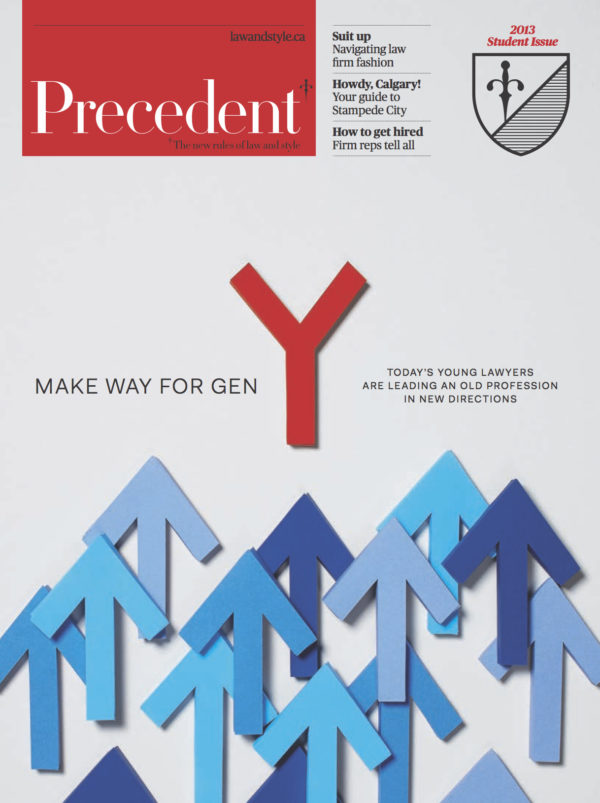
University of British Columbia student Liz Pan loves to run. “I run when I’m stressed, tired, happy, upset,” says the 3L, who just summered with Boughton Law in Vancouver. She runs about four times a week: three outings of up to eight kilometres and a Sunday run as long as 25 km. She uses a Fitbit — a device that measures physical activity and sleep — to keep her aware of her activity levels on days where she’s sitting a lot. (She’ll then compensate by taking the stairs more often.) Her device tells her she averages just six hours of sleep per night. “My sleep is probably like most other law students’: bad.”
Her diet consists of a mix of whole grains, fruit, greens and tofu for breakfast and lunch. She carries around her own snacks of baby carrots, apples and Luna bars. Dinner and nighttime nibbles usually come from a coffee shop. “The later it gets, the more I crave sugary baked goods.” She’s not a big water drinker and never consumes coffee, but loves her mint tea.
What the experts have to say
Meg Sharp, executive director of personal training, Cambridge Group of Clubs and the Toronto Athletic Club, says “running is a phenomenal form of cardiovascular exercise.” But she worries Pan might be at risk of over-use injuries to her knees, ankles or feet — particularly since she’s not getting a lot of sleep, which is when muscles repair and recover. She’d like to see Pan do shorter, more frequent workouts. “Intensity is often overlooked and is more important than volume.”
Running up hills or upping the tempo of her runs will do as much for her cardiovascular fitness as a 25-km outing. Pan can use the freed up time for two workouts a week that focus on strength and resistance training using weights or her own body weight — things like push-ups and squats. That will strengthen her upper body, better balance out her leg muscles to prevent running injuries and bolster her overall bone mineral density.
Karen Graham, a Winnipeg-based registered dietitian, approves of Pan’s breakfast and lunch choices and her avoidance of caffeine. Where she needs to focus: healthy dinners. Graham suggests Pan perfect speedy meals such as scrambled eggs spiked with cheese and vegetables, served with toast or instant brown rice. Or, prepare one-meal portions of cooked ground beef or chicken breasts that can be easily thawed and made into quick meals.
As for that lack of water, Graham suggests Pan keep a reusable bottle filled in her bag. “Indoor classroom environments can be dry and keeping hydrated helps you feel better.” She thinks more water will help Pan control her snack cravings. As would subbing in a walk instead of a run sometimes — running makes you extremely hungry. Plus, walking has been linked to a longer life and you’re less likely to injure yourself. As for the snacking, there’s nothing wrong with an occasional treat. Graham suggests a daily “treat budget” — a planned number of indulgences, perhaps two a day — so Pan can indulge in moderation without guilt.
 Go the #!%* to sleep
Go the #!%* to sleep
Think sleep is a waste of time? Close that book, turn off that screen — shut-eye is the best thing ever for your mind and body. Here’s what it does for you
Keeps you safe
According to a study of 19,000 new drivers, young adults who sleep six hours a night or less are 20 percent more likely to be in a car accident. Long term it’s bad too: sleeping less than six hours means you have a 12 percent higher chance of dying prematurely, according to a European study that looked at 1.3 million people over 25 years.
Trims your waistline
Numerous studies link getting too little sleep to putting on weight. There are many theories as to why: sleep might play a role in regulating your metabolism. Staying up late leads to the munchies as well. A report from 2008 that reviewed findings from 36 previous studies found the sleep-weight connection is stronger the younger you are.
Makes you smart
When you don’t sleep after studying, your mind misses out on processing what you’ve read. Your ability to retain what you learn the next day decreases by up to 40 percent when you pull an all-nighter. Feeling foggy? A 2010 U.S. study found a 90-minute afternoon nap gave people better learning abilities later in the day.

This story is from the 2013 edition of PrecedentJD Magazine
Photo courtesy of Creative Commons
Image of Samuel L. Jackson courtesy of Helga Esteb/Shutterstock
